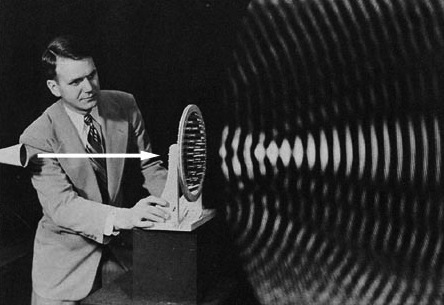This is just off the top of my head and I've tried to keep it short(ish). Most of this will be very obvious, but I've included a few secret tricks too that hopefully might save someone some learning time. Note that I'm purposely being a bit rock/pub venue-centric because I figure if you are a studio mixer starting to work live, these are the sort of places you'll most likely be working.
Actual Mixing Tips
I find studio sound and live mixing to be almost opposite of each other. The gear is essentially the same, but what you use it for can be very different. For example, EQ and compression in the studio is generally used as creative tools, whereas in a live context they are usually used for fixing acoustic problems caused by the forcing of a loud act into an even louder PA system in a bad sounding room.The Set Up
Besides the competency of the band, the most important piece of gear in a live environment is the EQ (and crossover) over the front of house speakers. This is the first thing you should get right, or learn how to get right. Obviously the EQ is used to tune the PA to the room, but once you have set the basic gains and levels for a band, this is what you play with to get the mix to sound good, not the desk EQs. Don't even think about touching the EQ on the mixing desk unless you have tweaked the front of house EQ to perfection. In fact, if you are using the EQs on the desk, then you probably either have the PA tuned wrong, or have the mics placed wrong. In my opinion, most venues' desks only really need to have low pass filter knobs, gain knobs and volume faders.The best way to get good at tuning a PA (and monitors) is to spend a lot of time with a big graphic EQ and train your ear to get to know all the frequencies. Flatten the graphic and push each one up slowly until each frequency feeds back. If you can get up to the stage where your ear recognises a frequency and your hand knows where it lives, then you are already most of the way to being a good live mixer (as long as you also know how to roll leads well of course).
Without even needing to listen, add a low pass filter to everything except for things that really *really* need bass (i.e. the kick drum usually but not always, things DI'd and generally bass guitar type things) .. most venues are horrible when it comes to phase cancellation so the less low frequencies you have bouncing (and cancelling each other out) around the room the better.
Don't assume once you have the eq right then you are done. As soon as the room fills with people all your work suddenly just becomes just preparation. You will need to feel confident to tweak to main graphic constantly as the sound of the room changes.
With most bands, a hell of a lot of the sound you hear at a gig is from the stage, even at large venues. Get the stage sound right with the band first before you even turn on the PA. Not many people think about this, but live mixing is mainly about using a PA to balance and re-enforce the sound that is coming off stage, unlike studio where the what is coming from the desk is the entire sound.
The balance of a band without a PA is the most important thing... they should be able to mix themselves at a good level, play consistently and tightly, have good gear and know how to arrange songs. If you find a band that sounds good before you turn up the faders, do not lose that band: mix them cheaply if you can, it makes you look really good and you will get lots of work from that with no effort.
Some other technical live mixing tips off the top of my head
- If you can, put a compressor over the whole mix.
- The kick drum should have the best mic on it and should be slightly nudging the front of house compressor.
- Bring closed headphones, quality is irrelevant, but they need to be closed.
- Use your headphones to PFL what the band are hearing though their monitors. Check them almost every song and adjust accordingly.
- Don't be scared to move the speakers around if you don't think they're pointing at the audience. The same goes for foldback... monitors must point directly at the members of the band and not into microphones.
- The less open mics on stage the better.
- Use expanders instead of gates if available.
Mics
If you don't have a good kick mic, get a trigger unit... the worst thing in the world is a bad kick sound. Do not use a crap microphone on the kick. Triggers can be surprising effective on bass drums at a live gig. Besides the control they give you and the lack of a need for a compressor, you can sit them anywhere you want in a mix without worrying about acoustic issues, plus they don't tie up your best mic (in fact the crappier the mic, the easier the trigger is to use)A really obvious one, but sometimes forgotten: Not many condensers work live. A cheap (not bright) large diaphragm condenser usually sounds amazing on a guitar and of course condensers are for overheads etc ... In general I would avoid them as they usually cause feedback problems and are annoying and expensive to replace when someone knocks them over.
Foldback Tricks
If someone wants more guitar in their foldback, don't turn the guitar up, put a bit of a 2k peak (or whatever frequency the instrument is mainly living in) into the monitor's EQ. If it's the actual musician that wants their own instrument louder in the foldback then it's probably better to get them to turn their amp towards their ears, rather than use foldback speakers which are designed mainly for voice and are most likely having trouble just coping with that job.You don't need to wait for the band to make foldback requests, try and set their monitor levels by PFL-ing the auxiliary sends through headphones. I find if I do that first, people are generally happy with the foldback straight up and it saves a lot of communication time
Handy hint: no one else in the world (besides Aus and NZ) use the word "foldback". Everyone else in the world sensibly calls them "Monitors".
Tips for Digital Desks
If you are unfamiliar with a particular desk, most of the time you can download the offline software in advance, and most of the time it will be exactly the same software as the actual desk uses. This gives you a good chance to become familiar with the machine before you go to the venue. In many cases you can even set up a basic channel strip and some inserts and take it to the show on a USB stick (make sure you speak to the house person before you do that though).Don't be scared (or too proud) to enlist the help of the house mixer or crew. You know what you want and how the band should be mixed... the house mixer is there to help with all things technical and will know their gear really well. If you haven't used a particular desk before, and time (as always) is short, just tell them what you want and get them to set up the desk ready for you to operate easily. This includes setting up shortcuts for mixing states you will need and tap delays and such (sends on faders, access to compressors etc).
Practicalities
To have a relatively stress free gig, get there early, tune the PA and foldback, then put on some good music to listen to, run leads and set up so that the stage is ready when the band gets there. This makes you look professional and gives you more time to get the sound right when the actual sound checking starts. Being early also gives you a buffer to fix problems (like broken stands and dodgy multicores). Bands aren't very patient at waiting around while the stage is set up, plus it's really annoying to set up a stage while people are warming up, bashing away at snares and standing on your leads.If there are multiple acts playing one the same night with very different instrument line ups, set up every line you need right from the start. You don't want to be plugging in channels if you can help it while there is an audience (you will have other things to do). As the night progresses, pack down anything that won't be used for the rest of the night, you will thank yourself later when you finish and half of the stage is already packed up.
Bring walk in/in between/after show music and make sure it's good. It doesn't necessarily have to match the genre of the band, it just has to be thought through and suit the night, not just randomly played off your IPod. It makes a big difference to the atmosphere. Usually its good to arrange with the band in advance to make up a playlist of their choosing.
One of my pet hates is mixers who sound check bands in between acts during a show, it doesn't help at all and it's annoying for everyone involved. Personally I'd rather hear the first half of the first song sound a bit weird than someone repetitively bashing a floor tom in between bands. As soon as the doors open it is a show and not a sound check. If there isn't time to check before the show, get the band to start their set with a song that also works well as a sound check.
Speaking of sound checking drums... a drum kit is one instrument, it is not a collection of drums making a drum kit. You don't need to sound check every drum in isolation, in fact it doesn't make sense. Just get the drummer to go crazy (they love doing that anyway) and sound check the kit all together. The kick drum is an exception to this rule, whilst being the most important instrument in the show along with the vocals, it should be checked and perfected first.
In fact, the above advice can be extrapolated to an entire band. As long as there isn't any acoustically problematic instruments involved, the order of things to sound check should be:
- Kick drum
- Drum kit
- Everything at once.
Unlike the studio where you have a some control over the humans, when you're mixing at the pub, the band will be probably be drunk afterwards and busy chatting to their friends. My advice is, when doing pub gigs, make sure you have arranged to get your cash as soon as possible; you will be quickly forgotten when the alcohol kicks in and the sycophantic gushing/schmoozing/sleezing begins after the show. You have some responsibility in this too, make sure you've planned it so that you pack up the gear as soon as possible; This way the pub will pay the band and the band can pay you.
Be very extra nice to the house mixer, bouncers and bar staff. They will appreciate it and it will make your night more enjoyable, don't forget that you are also staff when you're mixing.
Planning
Planning is ridiculously important for live sound because there is never ever ever enough time (even when you work with popular bands in hired rooms).- For your own sanity on the night, get a stage plan from band in advance otherwise they will surprise you with extra instruments you didn't plan for.
- Try and get tech specs of the venue early (most venues have them on their website to download). Many places, even large theatres are woefully under stocked and you will generally have to bring your own stuff if you want a good sound. Most commonly DIs are lacking and microphones are old and broken, or just crap.
- Send stage plan and requirements to the house mixer/tech people a week before. This is just in case they can't supply what you need and you have to source yourself
Basically, the trick is to do as much work as you can away from the venue because once you're there everything and everyone will be in a hurry.
Aesthetics
Stuff that isn't your job, but no one else will do it. A neat stage.
- Make sure leads on stage are neat. Besides the mess looking bad, there's less chance of people stepping on them later when you are packing up.
- Before the show do a final sweep of the stage and get rid of any crap that looks bad... especially in pubs, people tend to leave milk crates (without black on them) all over the stage, making the show look like amateur hour
- Bring black to cover ugly things
End
That's about all I can think of for now, if you want more, feel free to have a read of the my rant aimed towards helping bands sound good without a soundy











